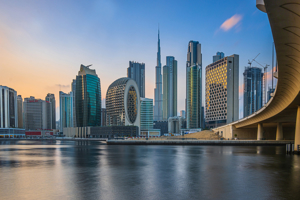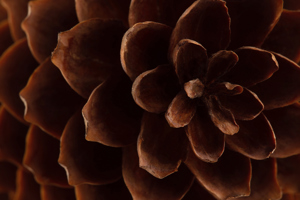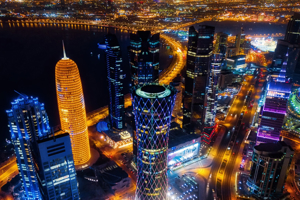Renewable Energy
Overview
Although the United Arab Emirates (UAE) has traditionally relied on its oil and gas reserves, in recent years it has made great strides in the renewable energy sector. With the highest portfolio of renewable energy assets in the region, it has become a leader in the development of the sector.
Beginning in 2006, the UAE established Masdar, the Abu Dhabi Future Energy Company, and Masdar City, the region’s first carbon-neutral zero waste city. In 2009, the UAE further established the Emirates Nuclear Energy Corporation, and the International Renewable Energy Agency established its headquarters in Abu Dhabi.
The UAE leads efforts to adopt the latest innovations that address climate change and mitigate the effects of global warming and plays a major role in supporting the United Nations sustainable development goals 2030.
In 2017, the UAE launched the UAE energy strategy 2050, which was further updated in July 2023 and aims to diversify current energy sources and double the country's use of clean energy sources by 2050. The UAE has committed to achieve net-zero carbon emissions by 2050 and the strategy sets out a roadmap to reduce the UAE's carbon footprint by an ambitious 70% and to boost clean energy to reach 30% of the country’s total energy capacity.
The UAE has allocated over USD163 billion to meet its goal of increasing the contribution of clean energy sources to 50% (44% renewable and 6% nuclear) by 2050. This is in line with the UAE’s Vision 2021 strategic plan to generate 27% of its energy requirements from clean sources, including nuclear power.
The Supreme Council of Energy has also developed an implementation plan for the Emirate of Dubai, known as the clean energy strategy 2050, which aims to provide 75% of Dubai’s total energy output from clean energy sources by the year 2050.
Abu Dhabi has also unveiled ambitious plans to generate 50% of its energy requirements from clean sources by 2030, through its climate change strategy 2023-2027 which sets out specific initiatives and policies aimed at reducing the emirate’s emissions by 22% compared to 2016 levels.
Definitions
- AD Power: Abu Dhabi Power Corporation.
- DOE: Department of Energy.
- DSCE: Dubai Supreme Council of Energy.
- DEWA: Dubai Electricity and Water Authority.
- EWE: Etihad Water and Electricity.
- EWEC: UAE Water and Electricity Company.
- Ministry of Energy: Federal Ministry of Energy and Infrastructure.
- IPP: Independent power producers.
- RSB Dubai: Dubai Regulation and Supervision Bureau.
- SEWA: Sharjah Electricity, Water and Gas Authority.
- TAQA: Abu Dhabi National Energy Company.
Practical Guidance
Regulators
The regulation of the renewable energy sector is integrated with the conventional energy sector in the UAE and is therefore generally overseen and supervised by the same regulators. The Federal Ministry of Energy and Infrastructure (the Ministry of Energy) is the primary regulator at the federal level and is responsible for establishing policies and procedures for the water and electricity sectors in the UAE.
Etihad Water and Electricity (EWE) is the dominant player in the northern emirates (Ajman, Fujairah, Ras Al Khaimah, Sharjah and Umm Al Quwain) and engages in all sectors of the market, from generation to transmission and then to distribution. The Ministry of Energy works in conjunction with EWE to implement the federal government's electricity policy in the northern emirates.
Abu Dhabi's electricity sector is regulated by the Department of Energy (DOE) and the UAE Water and Electricity Company (EWEC). The DOE is responsible, inter alia, for controlling, supervising and organising the energy sector in Abu Dhabi and for issuing licences to entities engaged in the energy sector. The EWEC is the sole provider of water and electricity in Abu Dhabi and is empowered to contract with all entities licensed to produce and distribute water and electricity in Abu Dhabi.
The Abu Dhabi National Energy Company (TAQA), following its merger with the Abu Dhabi Power Corporation (AD Power) in 2020, is one of the world’s largest utility companies with assets in excess of AED 180 billion in the Middle East, Africa, Europe and elsewhere. TAQA now owns the majority of AD Power’s generation, transmission and distribution assets, and therefore plays an integral role in developing, generating, transmitting and distributing energy and water throughout Abu Dhabi. Masdar, as mentioned above, plays a leading role in developing and operating utility-scale renewable energy projects, both in the UAE and overseas.
The main authorities regulating the electricity sector in Dubai are the Dubai Electricity and Water Authority (DEWA), the Dubai Supreme Council of Energy (DSCE) and the Dubai Regulation and Supervision Bureau (RSB Dubai).
The DSCE is the primary regulator of the energy sector in Dubai and regulates the exploration, production, storage, transmission and distribution of petroleum products and electricity. The DSCE also proposes any and all initiatives relating to the energy sector, which includes privatising its electricity assets.
RSB Dubai is authorised to regulate the electricity sector, subject to the supervision of the DSCE. RSB Dubai is mainly responsible for regulating, licensing and supervising electricity generating service providers, facilities and properties.
As with the other emirates, the main player in the electricity market is DEWA, Dubai's state-owned integrated power generation, transmission and distribution authority.
The main regulator in Sharjah is the Sharjah Electricity, Water and Gas Authority (SEWA). As with the other emirates, SEWA is responsible for the generation, transmission and distribution of electricity in Sharjah. SEWA is authorised to determine electricity prices and connection fees, which are subject to approval by the Ruler of Sharjah.
Investment in the UAE
As the UAE is located in the world’s “sun belt” and enjoys high solar irradiation, it is highly suitable for various forms of renewable energy technology, especially solar energy.
Mohammad bin Rashid Al Maktoum Solar Park in Dubai is the largest single-site solar energy project in the world. It is being developed over multiple phases and is designed to have a total capacity of 5 GW of renewable energy by 2030.
In addition, funding from seven international banks is now in place for the world's biggest solar power project namely a 2 GW project being built in Al Dhafra in Abu Dhabi.Abu Dhabi is also examining hydrogen as a method to progress its clean energy agenda.
UAE has announced a goal to divert 75% of solid waste from landfills and are investing heavily in waste-to-energy facilities, which also supports the UAE’s objective of increasing its clean energy output.
Emirates Waste To Energy Company, a partnership between Masdar and Bee’ah, has developed the first waste-to-energy facility in the UAE, located in Sharjah and diverts more than 300,000 tonnes of solid waste from landfills each year.
In Dubai, Warsan Waste Management Company, a partnership between Dubai Holding and a consortium of four leading companies, is developing the world’s largest waste-to-energy facility. It has been operational since March 2024 and will use 2 million metric tons of trash annually to produce electricity, enough to power approximately 135,000 homes.
The Middle East's first experimental wind-power plant was set up in the UAE on the Sir Baniyas Island, and Masdar is also an active investor in wind energy around the globe.
Such government policies, strategies and projects are encouraging entrepreneurs within the private sector to establish and develop renewable energy projects and related businesses, many of which may represent appealing growth opportunities for foreign and local investors.
The UAE is also an important player with respect to renewable energy transactions in the wider Middle East and North Africa (MENA) region, as investors often view the UAE as a commercial and legal hub for the region. Consequently, many projects located in MENA jurisdictions outside of the UAE will be operated by management based in the UAE.
Legal considerations for M&A transactions
As the energy sector is highly regulated in the UAE, it is key that a buyer conducts thorough due diligence to ensure that a target has obtained and maintained all required permits, licences and approvals. Following from this, in addition to the normal suite of warranties that would be included in a typical share purchase agreement, it is important to consider warranties specific to the renewable energy sector. For example, in respect of a solar energy power company, a buyer should include robust warranties with regard to the leasehold or freehold title of the underlying land. Additionally, warranties related to the solar energy company’s right to be connected to the relevant grid and infrastructure should be included in a share purchase agreement.
Generally speaking, share purchases are preferable to asset purchases in the renewable energy sector. Most projects have a main operational company, which is party to numerous key agreements with various counterparties. An asset sale of a renewable energy business would thus be cumbersome and difficult to implement, given the importance of key agreements remaining in place for the target’s business. Similarly challenging would be the acquisition of a partial interest in a renewable energy business rather than the entire business. An asset sale structuring of a partial acquisition would be difficult to achieve and would require additional consent.
It is common for key parties in the renewable energy project to incorporate a holding company or management company in the UAE, even where the renewable energy project is located in another jurisdiction in the MENA region. It is key that such parties be aware of recently enacted economic substance regulations in the UAE, which require certain onshore and freezone companies to maintain and demonstrate an adequate economic presence in the UAE. Additionally, to the extent the target business has entities incorporated in the UAE, it is important to assess whether the economic substance regulations are applicable to these entities, and whether they are in compliance. In addition, a further consideration is whether any change in the ultimate beneficial owners of the UAE subsidiaries arises as a result of the transaction. Where such ultimate beneficial ownership has been changed (or is anticipated to change) then a submission must be provided to the applicable UAE authorities.
Independent power producers (IPPs) are private entities, which own and/or operate projects to generate electricity and then sell it to a utility or government end user. The Emirates of Dubai and Abu Dhabi both significantly rely on the IPP model with respect to renewable energy production. Given that the key operational company in an IPP structure is likely to be incorporated onshore in the UAE, foreign investors will need to be mindful of UAE foreign ownership requirements.
In this regard, recent amendments to UAE legislation has modified the requirement that a UAE national, or an onshore entity wholly owned by UAE nationals, hold at least 51% of the share capital of a UAE onshore entity. Instead, a list of relevant activities permitted for 100% foreign ownership has been published by each of the Dubai Economic Department and the Abu Dhabi Department of Economic Development. These lists include power generation, solar energy systems and components trading, solar panel manufacturing, and solar panel assembling.
Reproduced with permission from LexisNexis Middle East. For further information, please visit their website.












